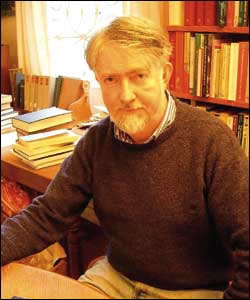Work on Austen wins prize
10 May 2006
Prof Peter Knox-Shaw.
Knox-Shaw was a full-time member and senior lecturer of the English department from 1975 to 1991.
"I left when I inherited an apple farm in Elgin from my mother and when historical studies appeared to be at a low ebb."
Nonetheless, he continued to publish widely on literature and culture, mainly on the Modern and Romantic periods, and to supervise postgraduate students. He was made an honorary research associate of the department in 1994.
In an e-mail from the farm he writes: "My aim in writing the book was twofold. I wanted to demonstrate how responsive Jane Austen was to the deep social changes that took place during her lifetime, changes that now lie at the foundation of the modern world and I wanted to reassert her presence as a liberal and progressive figure in it."
His first task was to demolish late twentieth-century academic theory that Austen was "a reactionary Evangelical bent on reversing the French Revolution and all its works".
"Far more exhilarating, however, was the job of construction: the steady discovery of how well versed Jane Austen was in a whole range of late Enlightenment writers, quite apart from the great feminist Mary Wollstonecraft to whose influence a number of critics had already done justice.
"It was especially thrilling to find the imprints of David Hume and Adam Smith in the novels, and to restore the contexts of a variety of Enlightenment debates in which the novels engage. Work on Jane's surviving letters, on the family archives, and on other neglected materials such as the (then) unpublished poetry of her brother, James, and on the periodical he ran as a student, enabled me to bring new definition to the cultural resources on which Jane Austen drew. Work of this kind only realises its significance, however, in conjunction with close reading of the text. It was particularly challenging to follow the way Jane Austen's outlook underwent modulation as she entered the Romantic period.
"It's easy to think that looking into the work of great writers is a matter of ever-diminishing returns, like sifting the gold dumps. But the hidden has a special value in historical research. In 1905, for example, the Austen family published an essay on St Helena, written by Jane's brother, Francis, which includes a passage on slavery.
"But, concealing their excision, they cut out its climax, which includes the sentence, 'Jealous as England has ever been of her own liberty, she should pay equal attention to the inalienable rights of all nations, of what colour so ever they may be'. Strong meat even in the early days of the nineteenth century, this protest was later not easy to bear, and so lost to biographers and critics, all of whom stuck to the print.
"The Enlightenment on which Jane Austen drew was a late flowering of the main European tradition, typified by its scepticism and its stress on human irrationality. It stands at some remove from the popular conception of the term, in which reason, mechanism and control figure broadly, and is still much subject to misinterpretation."
 This work is licensed under a Creative Commons Attribution-NoDerivatives 4.0 International License.
This work is licensed under a Creative Commons Attribution-NoDerivatives 4.0 International License.
Please view the republishing articles page for more information.










